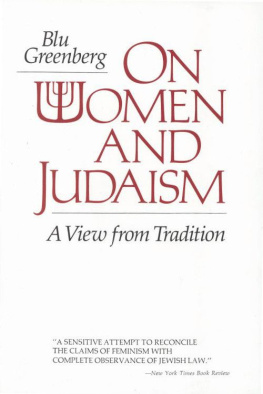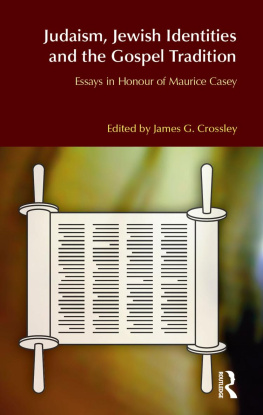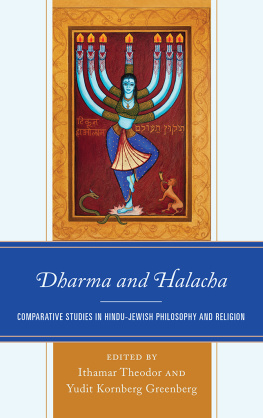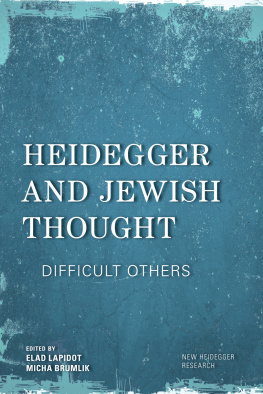Blu Greenberg - On Women and Judaism: A View From Tradition
Here you can read online Blu Greenberg - On Women and Judaism: A View From Tradition full text of the book (entire story) in english for free. Download pdf and epub, get meaning, cover and reviews about this ebook. year: 2013, publisher: The Jewish Publication Society, genre: Home and family. Description of the work, (preface) as well as reviews are available. Best literature library LitArk.com created for fans of good reading and offers a wide selection of genres:
Romance novel
Science fiction
Adventure
Detective
Science
History
Home and family
Prose
Art
Politics
Computer
Non-fiction
Religion
Business
Children
Humor
Choose a favorite category and find really read worthwhile books. Enjoy immersion in the world of imagination, feel the emotions of the characters or learn something new for yourself, make an fascinating discovery.
- Book:On Women and Judaism: A View From Tradition
- Author:
- Publisher:The Jewish Publication Society
- Genre:
- Year:2013
- Rating:3 / 5
- Favourites:Add to favourites
- Your mark:
- 60
- 1
- 2
- 3
- 4
- 5
On Women and Judaism: A View From Tradition: summary, description and annotation
We offer to read an annotation, description, summary or preface (depends on what the author of the book "On Women and Judaism: A View From Tradition" wrote himself). If you haven't found the necessary information about the book — write in the comments, we will try to find it.
A classic for more than 20 years, this thought-provoking volume explores the role of Jewish women in the synagogue, in the family, and in the secular world. Greenberg offers ways to change present Jewish practices so that they more readily reflect feminine equality.
On Women and Judaism: A View From Tradition — read online for free the complete book (whole text) full work
Below is the text of the book, divided by pages. System saving the place of the last page read, allows you to conveniently read the book "On Women and Judaism: A View From Tradition" online for free, without having to search again every time where you left off. Put a bookmark, and you can go to the page where you finished reading at any time.
Font size:
Interval:
Bookmark:
Blu Greenberg
ON WOMEN & JUDAISM
A View from Tradition
Philadelphia Jerusalem
THE JEWISH PUBLICATION SOCIETY OF AMERICA
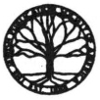
Copyright 1998 by The Jewish Publication Society of America
All rights reserved
No part of this publication may be reproduced or transmitted in any form or by any means, electronic or mechanical, including photocopy, recording, or any information storage or retrieval system, except for brief passages in connection with a critical review, without permission in writing from the publisher: The Jewish Publication Society, 1930 Chestnut Street, Philadelphia, PA 19103.
Designed by Adrianne Onderdonk Dudden
ISBN 978-0-8276-0226-7
Library of Congress Cataloging in Publication Data
Greenberg, Blu, 1936
On women and Judaism.
Includes bibliographical references.
1. Women in JudaismAddresses, essays, lectures. I. Title.
BM729.W6G73 296.3'878344 8111779
Several of the essays in this book originally appeared, in slightly different form, in the following publications: Hadassah Magazine; Tradition; Lilith; Shma; Judaism; and in The Jewish Woman: New Perspectives, ed. Elizabeth Koltun, and A Coat of Many Colors: Jewish Subcommunities in the United States, ed. Abraham Lavender.
To Yitz
Contents
Preface
A S the reader will note, the greater part of this book consists of essays that have appeared in a variety of journals, though I have taken the opportunity afforded by the present publication to make some revisions. Nevertheless, there is still some overlap here and there. I have tried to keep this to a minimum, but a certain repetition was necessary in order to flow logically from one idea to another within a given chapter.
There are also many issues that are not dealt with altogether. This effort was not intended to be an exhaustive analysis of women and Judaism, nor could any one person undertake the task. The Jewish tradition is a vast one. Even within the few areas that I treat, I have touched but the tip of the iceberg. This is the strength and wonder of the tradition, not its handicap. Thus, one must overcome the feeling of knowing nothing. One simply makes a beginning somewhere and then proceeds with a good deal of subjective feeling. I can only hope that those who know more, as well as those who know less, will be able to find something of merit in this work, either in the nature of a new perspective or in the encounter with previously unfamiliar sources.
There is, however, a unifying theme throughout the collection. It comes in the form of the questions running through my mind as I reflect on each particular issue. What position can we as committed Jews take toward feminism? What can we integrate, what must we reject? Where must we separate ourselves from mainstream feminism, and what are the pressure points in our tradition that, because we are women, we must locate? How and where ought the pressure to be applied so that tradition will neither discriminate nor close off certain parts to us? How can we become more responsible, fully equal members of a holy community? What claims do women have on tradition and Halakhah as the Jewish people move through the fourth millennium of their existence?
If I had to sum up my own position on the matter, it would run somewhat as follows: Judaism is my life. It always has been, it always will be. Feminism is a new ethical movement of special appeal to me because I am a woman. It is also of merit to humanity in general because of its ethical nature. Every person, particularly religious leaders, ought to search for ways to absorb and integrate its basic claim that women are equal.
I have tried to show that there are both precedent and process within the Jewish tradition for bringing women to a position of full equality. This process need notindeed must notbe equated with a diminishing of the divine essence of Judaism and Halakhah. I am not unmindful of the tremendous sacrifice it took to bring me, as a traditional Jew, to this juncture in history. All those who preceded me labored hard to keep the chain intact. I do not want to break that chain. I do feel, however, that the link will be made stronger, rather than weaker, by a conjoining of feminist values with the structure of traditional Judaism.
I am pleased to make acknowledgment to the people who have had a share in this book. First, my parents, Rabbi Sam and Sylvia Genauer, gave me many blessings, especially that of growing up in a home rich with the love of tradition and Jewish learning. My childrenMoshe, David, Deborah, J.J., and Goodytolerated my erratic work habits and the expropriation of their time; they also made intelligent comments on many of the issues dealt with herein.
I give thanks to the many excellent teachers I have had over the years, particularly Nechama Leibowitz and Rabbi Meyer Feldblum, who taught me not only Torah but also how to probe the sources with questions. I am grateful to the many friends who, over the last decade, helped me to think differently about women. I also want to thank several people who contributed valuable assistance along the way: Rabbi Marc Angel, Roselyn Bell, Adina Feldstern, David S. Greenberg, Jonathan Javitch, Alvin Rosenfeld, Ruth Waxman, and Aviva Cantor Zuckoff. While their efforts have clearly made a difference in the quality of the individual chapters, they are in no way responsible for errors of fact, nor are they necessarily in agreement with the views expressed here. I am especially grateful to Maier Deshell, editor of The Jewish Publication Society of America, without whose gentle prodding, infinite patience, and deft editorial hand this book would not have seen the light of day.
Most of all, I want to acknowledge my debt to my husband, Irving Greenberg, from whom I have learned much in these past twenty-four years. He has not only taught me myriads of facts, but he has also influenced my thinking in a thousand areas; women and Judaism is but one. He read over my manuscript, in all its versions, and made countless corrections and suggestions, for all of which I thank him. My husband, of course, has spoken out himself on many of the issues discussed in this book. There are areas of agreement between us, as well as differences. For the reader who is curious about such matters, suffice it to say that there is much in this work that reflects his thinking. There is also a good deal that reflects my new ability not to back down in the face of his critique.
To the One who does not have to read my thoughts to know them, I am grateful for the blessings of life, good health, and love, which only God can grant or take away, and without which the body, the mind, the heart could not function.
B.G.
July 1981
Feminism: Is It Good for the Jews?
T HERE is much to be learned from the womens movement that can enhance the quality of our lives as Jews. For feminists there is much to be gained from a serious regard of traditional Jewish values. Yet at this point the possibility of a positive relationship between the two seems improbable, if not impossible. Traditional Judaism has written off feminism as an extremist movement, a temporary cultural fad. Feminists have reviled rabbis as womenhaters, male chauvinists, or, at best, men with ancient hang-ups. A religion and an ideology that under happier circumstances might have nurtured each other instead have become antagonists. Why?
The aims, achievements, and to some extent even the processes of feminism have been revolutionary. The fact that it has been a bloodless revolution leads some people to dismiss feminism as a petulant, middle-class womens hobby. Regardless, the womens movement has profoundly altered social attitudes toward women and the way women think about themselves. Increasingly, public philosophy and policy assume that women are full human beings with a capacity for achievement in all spheres in which men function. Women are no longer simply adjuncts of the men in their lives. Our secular, legal, social, and educational systems are under constant pressure to include women as equals; our religious institutions, however, lag far behind in the process of recognition.
Next pageFont size:
Interval:
Bookmark:
Similar books «On Women and Judaism: A View From Tradition»
Look at similar books to On Women and Judaism: A View From Tradition. We have selected literature similar in name and meaning in the hope of providing readers with more options to find new, interesting, not yet read works.
Discussion, reviews of the book On Women and Judaism: A View From Tradition and just readers' own opinions. Leave your comments, write what you think about the work, its meaning or the main characters. Specify what exactly you liked and what you didn't like, and why you think so.

